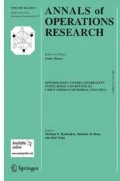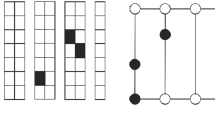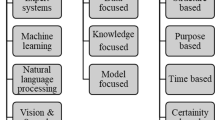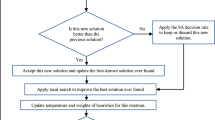Abstract
Knowledge-based systems (KBS) can help to make simulation available to a large group of users. We want to exemplify this by describing a decision support system (DSS) for short term rescheduling in manufacturing called SIMULEX. It couples expert systems, simulation, and a multiattribute decision making (MADM) procedure to assist the production manager. After an introduction to simulation as a problem solving tool, the current problems in production control and the goals of the project are described. Then, the various components of SIMULEX are explained in some detail. Some results and a short outlook conclude the article.
Similar content being viewed by others
References
H. Adelsberger and J.J. Kanet, The Leitstand — a new tool for computer-integrated manufacturing, Prod. Inventory Manag. 1 (1991) 43.
J.C. Bean and J.R. Birge, Match-up real-time scheduing, Department of Industry and Operations-Engineering, University of Michigan (1985).
B.D. Becker and W. Dangelmaier, EXCON — an expert system to construct control strategies for simulation systems in manufacturing, in:Proc. 1986 Summer Computer Simulation Conf., eds. R. Crosbie and P. Luker (SCS, San Diego, 1986) p. 731.
R. Belz, SIMULEX — solving rescheduling problems by knowledge-based simulation, in:Proc. 1992 European Simulation Symp., Simulation and AI in Computer-Aided Techniques, eds. W. Krug and A. Lehmann (SCS, San Diego, 1992) p. 371.
R. Belz, Integration aller Phasen der Fertigungsdisposition durch wissensbasierte Simulation, Working Paper 8/1992, Department for Information Systems, Universität Erlange-Nürnberg, Nürnberg, Germany (1992).
J.P. Brans, B. Mareschal and Ph. Vincke, PROMETHEE: a new family of outranking methods in multicriteria analysis, in:Operational Research '84 IFORS, ed. J.P. Brans (North-Holland, Amsterdam, 1984) p. 477.
P. Chen, Truncated inverse sampling procedure for multinomial subset selection, Tech. Report No. S-41, Department of Mathematics, Syracuse University, New York, USA (1987).
W. Dangelmaier, A. Keller, U. Mussbach-Winter and H. Wiedenmann, Kapazitätsorientierte Auftragsbildungsverfahren, Zeits. wirtschaftliche Fertigung und Automatisierung 14 (1989) 676.
W. Dangelmaier, H. Kühnle and U. Mussbach-Winter, Einsatz von Künstlicher Intelligenz bei der Produktionsplanung und -steuerung, CIM Management 1 (1990) 4.
D.R. Ford, Combining simulation and artificial intelligence: a practical example, in:Proc. 1988 Summer Computer Simulation Conf. eds. C.C. Barnett and W.M. Holmes (SCS, San Diego, 1988) p. 648.
M.S. Fox and K.G. Kempf, Complexity, uncertainty and opportunistic scheduling, in:2nd Conf. on Artificial Intelligence Applications, ed. Ch. Weisbin (IEEE Society Press, Washington, DC, 1985) p. 387.
D. Goldsman, On selecting the best ofK systems: expository survey of indifference-zone multi-nomial procedures, in:Proc. 1984 Winter Simulation Conf., eds. S. Sheppard, U. Pooch and D. Pegden (SCS, San Diego, 1984) p. 107.
D. Goldsman, A multinomial ranking and selection procedure: simulation and applications, in:Proc. 1984 Winter Simulation Conf. eds. S. Sheppard, U. Pooch and D. Pegden (SCS, San Diego, 1984) p. 259.
D. Goldsman, B.L. Nelson and B. Schmeiser, Methods for selecting the best system, in:Proc. 1991 Winter Simulation Conf., eds. B.L. Nelson, W.D. Kelton and G.M. Clark (SCS, San Diego, 1991) p. 177.
S.S. Gupta and K. Nagel, On selection and ranking procedures and order statistics from the multinomial distribution, Sankhya: The Indian Journal of Statistics, Series B, 29 (1967) 1.
R. Hildebrand,Betriebswirtschaftliche Schwachstellendiagnose im Fertigungsbereich mit wissensbasierten Systemen (Physica, Heidelberg, 1992).
IBM Corporation (ed.),COPICS Relational Database Guide, IBM-Form 5688-143 (1990).
IBM Corporation (ed.),Expert System Environment — Reference Manual, IBM-Form SC38-7004-04, 5th ed. (1990).
IBM Corporation (ed.),Expert System Environment — Application Programming Guide, IBM-Form SC38-7020-02, 3rd ed. (1990).
IBM Deutschland GmbH (ed.),COPICS — Ein Informationssystem für Unternehmen der Fertigungs- und Grundstoffindustrie, IBM Form W12-0056-1 (Stuttgart, 1983).
A. Law and W.D. Kelton,Simulation Modelling and Analysis, 2nd ed. (McGraw-Hill, New York et al., 1991).
J.M. Mellichamp and Y.H. Park, A statistical expert system for simulation analysis, Simulation 4 (1989) 134.
P. Mertens, J. Helmer, H. Rose and Th. Wedel, Ein Ansatz zu kooperierenden Expertensystemen bei der Produktionsplanung und -steuerung, in:Interaktive betriebswirtschaftliche Informations- und Steuerungssysteme, eds. K. Kurbel, P. Mertens and A.W. Scheer (de Gruyter, Berlin, 1989).
R. O'Keefe, Simulation and expert systems — a taxonomy and some examples, Simulation 1 (1986) 10.
H.V.D. Parunak, Manufacturing experience with the contract net, in:Distributed Artificial Intelligence, Vol. 1, ed. M. Huhns (Pitman, London et al., 1988) p. 285.
H. Pierreval, Data analysis oriented techniques for learning about manufacturing control with simulation, in:Proc. European Simulation Multiconference: Simulation in the Factory of the Future and Simulation in Traffic Control, eds. H. Muller, R. Reddy and S. Takaba (SCS, San Diego, 1988) p. 61.
H. Rose, Computergestützte Störungsbewältigung beim Durchlauf von Produktionsaufträgen unter besonderer Berücksichtigung wissensbasierter Elemente, Ph.D. Dissertation, Universität Erlangen-Nürnberg, Nürnberg, Germany (1989).
R.C. Schank and P.G. Childers,The Cognitive Computer. On Language, Learning and Artificial Intelligence (Addison-Wesley, Reading, 1984).
E. Schmitt, Werkstattsteuerung bei wechselnder Auftragsstruktur, Ph.D. Dissertation, Universität Karlsruhe, Karlsruhe, Germany (1989).
B.J. Schroer, F.T. Tseng, S.X. Zhang and J.W. Wolfsberger, Automatic programming of manufacturing simulation models, in:Proc. 1988 Summer Computer Simulation Conf., eds. C.C. Barnett and W.M. Holmes (SCS, San Diego, 1988) p. 569.
Th. Wedel, Wissenbasierte dynamische Konfiguration der Parameter von Standardpaketen zur Produktionsplanung und -steuerung am Beispiel des IBM-Modularprogramms COPICS — Grundkonzepte und Einstellregeln, Ph.D. Dissertation, Universität Erlangen-Nürnberg, Nürnberg, Germany (1990).
S.D. Wu, R.H. Storer and P.-C. Chang, One-machine rescheduling heuristics with efficiency and stability as criteria, Comp. Oper. Res. 1 (1993) 1.
S. Zelewski, Expertensysteme in der Prozeßplanung und -steuerung in der Fabrik der Zukunft — Ein Überblick über Konzepte und erste Prototypen, Working Paper No. 22, Seminar für Allgemeine Betriebswirtschaftslehre, Industriebetriebslehre und Produktionswirtschaft, Universität Köln, Köln, Germany (1988).
G. Zimmermann,PPS-Methoden auf dem Prüfstand: was leisten sie, wann versagen sie? (Verlag moderne Industrie, Landsberg am Lech, 1987).
G. Zimmermann, Neue Ansätze zur Strukturierung von PPS-Systemen — Erwartungsbezogene und kundenauftragsorientierte Disposition, Fortschrittliche Betriebsführung/Ind. Eng. 2 (1989) 72.
Author information
Authors and Affiliations
Rights and permissions
About this article
Cite this article
Belz, R., Mertens, P. SIMULEX — a multiattribute DSS to solve rescheduling problems. Ann Oper Res 52, 107–129 (1994). https://doi.org/10.1007/BF02032125
Issue Date:
DOI: https://doi.org/10.1007/BF02032125




